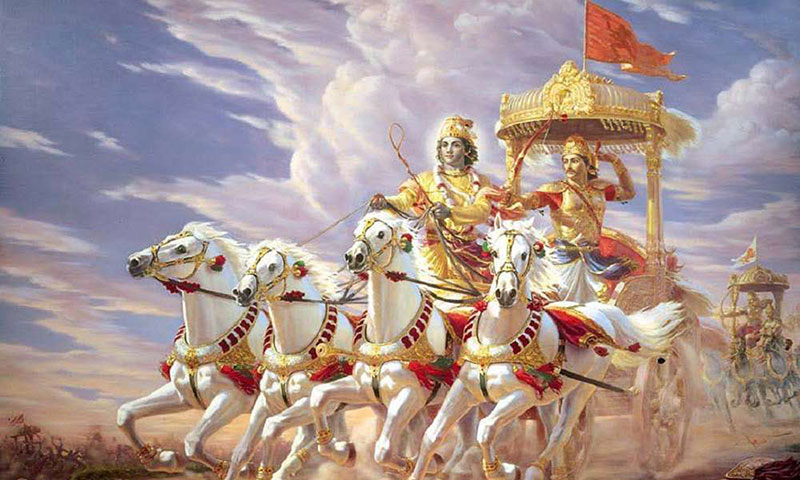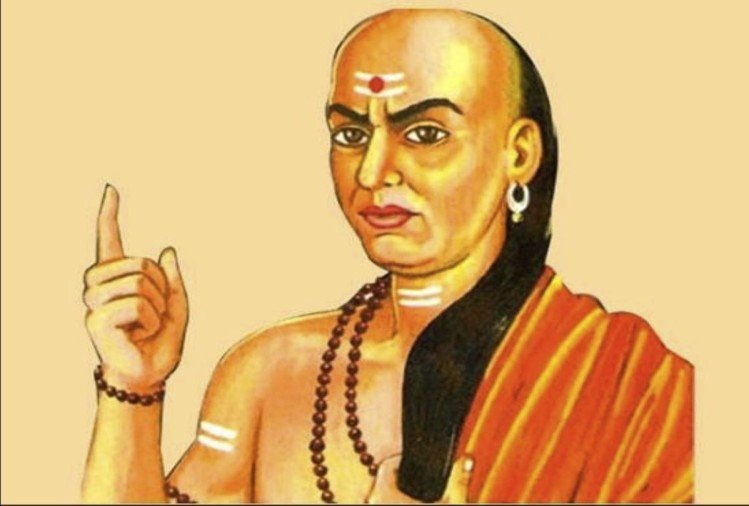Srimad Bhagawad Gita अथ त्रयोदशोऽध्यायः । क्षेत्रक्षेत्रज्ञविभागयोगः
atha trayodaśo’ dhyāyaḥ | kṣetrakṣetrajñavibhāgayogaḥ
श्रीभगवानुवाच
इदं शरीरं कौन्तेय क्षेत्रमित्यभिधीयते ।
एतद्यो वेत्ति तं प्राहुः क्षेत्रज्ञ इति तद्विदः ॥१३- १॥
The Blessed Lord said:
This body, O son of Kunti, is called the Kshetra, and that which is conscious of it is called Kshetrajna (embodied self) by those who have knowledge thereof.
क्षेत्रज्ञं चापि मां विद्धि सर्वक्षेत्रेषु भारत ।
क्षेत्रक्षेत्रज्ञयोर्ज्ञानं यत्तज्ज्ञानं मतं मम ॥१३- २॥
And know the Kshetrajna (embodied self) in all the bodies (Kshetras) to be Myself, O descendant of Bharata. The knowledge of the Kshetra and Kshetrajna (i.e., matter and spirit) is, in My opinion, true knowledge.
तत्क्षेत्रं यच्च यादृक्च यद्विकारि यतश्च यत् ।
स च यो यत्प्रभावश्च तत्समासेन मे शृणु ॥१३- ३॥
What that Kshetra is, what it is like, what its modifications are, whence it arises, and what its forms are; and also what the other entity (the Kshetrajna) is, and what its powers are – hear that from Me in brief.
ऋषिभिर्बहुधा गीतं छन्दोभिर्विविधैः पृथक् ।
ब्रह्मसूत्रपदैश्चैव हेतुमद्भिर्विनिश्चितैः ॥१३- ४॥
It has been sung differently by the sages (Rishis) and variously in different Vedic hymns, as also in passages indicative and descriptive of Brahman, furnished with reasons and decisive.
महाभूतान्यहंकारो बुद्धिरव्यक्तमेव च ।
इन्द्रियाणि दशैकं च पञ्च चेन्द्रियगोचराः ॥१३- ५॥
इच्छा द्वेषः सुखं दुःखं संघातश्चेतना धृतिः ।
एतत्क्षेत्रं समासेन सविकारमुदाहृतम् ॥१३- ६॥
The (five) great elements, egoism (Ahankara), the intellect, and the unmanifest, the ten sense-organs and the one (mind) and the five objects of the senses; 5 desire, aversion, happiness, misery, the body, intelligence and patience – thus the Kshetra has been described in brief together with its modifications.
अमानित्वमदम्भित्वमहिंसा क्षान्तिरार्जवम् ।
आचार्योपासनं शौचं स्थैर्यमात्मविनिग्रहः ॥१३- ७॥
इन्द्रियार्थेषु वैराग्यमनहंकार एव च ।
जन्ममृत्युजराव्याधिदुःखदोषानुदर्शनम् ॥१३- ८॥
असक्तिरनभिष्वङ्गः पुत्रदारगृहादिषु ।
नित्यं च समचित्तत्वमिष्टानिष्टोपपत्तिषु ॥१३- ९॥
अथ त्रयोदशोऽध्यायः । क्षेत्रक्षेत्रज्ञविभागयोगः
मयि चानन्ययोगेन भक्तिरव्यभिचारिणी ।
विविक्तदेशसेवित्वमरतिर्जनसंसदि ॥१३- १०॥
अध्यात्मज्ञाननित्यत्वं तत्त्वज्ञानार्थदर्शनम् ।
एतज्ज्ञानमिति प्रोक्तमज्ञानं यदतोऽन्यथा ॥१३- ११॥
Humility, unostentatiousness, harmlessness, forbearance, uprightness, service to the Guru, purity, steadiness, self-control, dispassion for sense-objects and absence of egoism, seeing misery and evil in birth, death, old age and sickness, non-attachment and non-identification with son, wife, home, etc., always being even-minded whether good or evil befalls, unswerving devotion to Me through the Yoga of non-separation, resorting to solitude, and aversion for company, always being devoted to spiritual knowledge, perception of the aim of the knowledge of Truth – all this is called knowledge. What is different from this is ignorance.
ज्ञेयं यत्तत्प्रवक्ष्यामि यज्ज्ञात्वामृतमश्नुते ।
अनादि मत्परं ब्रह्म न सत्तन्नासदुच्यते ॥१३- १२॥
I shall tell you that which has to be known, knowing which one attains immortality; it is the beginning-less, supreme Brahman, which is said to be neither being nor non-being.
सर्वतः पाणिपादं तत्सर्वतोऽक्षिशिरोमुखम् ।
सर्वतः श्रुतिमल्लोके सर्वमावृत्य तिष्ठति ॥१३- १३॥
With hands and feet everywhere, with eyes, heads and faces everywhere, with ears everywhere, It rests pervading everything in this world.
संपूर्ण रामायण पढ़ने के लिए यहां क्लिक करें
सर्वेन्द्रियगुणाभासं सर्वेन्द्रियविवर्जितम् ।
असक्तं सर्वभृच्चैव निर्गुणं गुणभोक्तृ च ॥१३- १४॥
It is manifest in the functions of the various sense-organs, yet bereft of all sense-organs, unattached, yet sustaining
everything, without attributes, yet the protector of the qualities.
बहिरन्तश्च भूतानामचरं चरमेव च ।
सूक्ष्मत्वात्तदविज्ञेयं दूरस्थं चान्तिके च तत् ॥१३- १५॥
It is without and within all beings, It is moving and unmoving, being subtle, It is incomprehensible, It is far, yet near.
अविभक्तं च भूतेषु विभक्तमिव च स्थितम् ।
भूतभर्तृ च तज्ज्ञेयं ग्रसिष्णु प्रभविष्णु च ॥१३- १६॥
It is undivided in beings and yet remains as if divided; that Knowable is the sustainer of beings as also the destroyer and creator.
ज्योतिषामपि तज्ज्योतिस्तमसः परमुच्यते ।
ज्ञानं ज्ञेयं ज्ञानगम्यं हृदि सर्वस्य विष्ठितम् ॥१३- १७॥
It is the Light of lights and is said to be beyond all darkness, It is knowledge, the knowable and accessible through knowledge, and is implanted in the heart of all beings.
इति क्षेत्रं तथा ज्ञानं ज्ञेयं चोक्तं समासतः ।
मद्भक्त एतद्विज्ञाय मद्भावायोपपद्यते ॥१३- १८॥
So the Kshetra, knowledge and the Knowable have been stated in brief. Knowing this, My devotee becomes fit to attain My being.
अथ त्रयोदशोऽध्यायः । क्षेत्रक्षेत्रज्ञविभागयोगः श्रीमद भगवतगीता संपूर्ण रामायण पढ़ने के लिए यहां क्लिक करें
प्रकृतिं पुरुषं चैव विद्ध्यनादी उभावपि ।
विकारांश्च गुणांश्चैव विद्धि प्रकृतिसंभवान् ॥१३- १९॥
Know both Prakriti and Purusha to be beginning-less and know the evolutes and the Gunas as born of Prakriti (Nature).
कार्यकरणकर्तृत्वे हेतुः प्रकृतिरुच्यते ।
पुरुषः सुखदुःखानां भोक्तृत्वे हेतुरुच्यते ॥१३- २०॥
With respect to the production of the effect (body) and the causes (the senses), Prakriti is said to be the cause, while with respect to the experience of happiness and misery, the Purusha is said to be the cause.
पुरुषः प्रकृतिस्थो हि भुङ्क्ते प्रकृतिजान्गुणान् ।
कारणं गुणसङ्गोऽस्य सदसद्योनिजन्मसु ॥१३- २१॥
For the Purusha residing in Prakriti experiences the Gunas born of Prakriti. The cause of its birth from good and evil sources is its attachment to the Gunas (senses).
उपद्रष्टानुमन्ता च भर्ता भोक्ता महेश्वरः ।
परमात्मेति चाप्युक्तो देहेऽस्मिन्पुरुषः परः ॥१३- २२॥
The supreme Purusha in this body is called the Onlooker, the Permitter, the Nourisher, the Protector, the great Lord,
and also the supreme Self.
य एवं वेत्ति पुरुषं प्रकृतिं च गुणैः सह ।
सर्वथा वर्तमानोऽपि न स भूयोऽभिजायते ॥१३- २३॥
He who thus knows the Purusha and the Prakriti together with the Gunas is not born again, whatever his mode of life.
ध्यानेनात्मनि पश्यन्ति केचिदात्मानमात्मना ।
अन्ये सांख्येन योगेन कर्मयोगेन चापरे ॥१३- २४॥
Some see the Self in the Self by the self through meditation, others by (the path of) knowledge, some others by Yoga
and (still) others by the path of action.
अन्ये त्वेवमजानन्तः श्रुत्वान्येभ्य उपासते ।
तेऽपि चातितरन्त्येव मृत्युं श्रुतिपरायणाः ॥१३- २५॥
Others (again), not knowing thus worship by hearing from others verily,
they also, being devoted to hearing, go beyond death.
संपूर्ण रामायण पढ़ने के लिए यहां क्लिक करें
यावत्संजायते किंचित्सत्त्वं स्थावरजङ्गमम् ।
क्षेत्रक्षेत्रज्ञसंयोगात्तद्विद्धि भरतर्षभ ॥१३- २६॥
Whatever being is born, moving or unmoving (animate or inanimate), know that, O best of Bharatas, to come from the mixing of the Kshetra and the Kshetrajna.
समं सर्वेषु भूतेषु तिष्ठन्तं परमेश्वरम् ।
विनश्यत्स्वविनश्यन्तं यः पश्यति स पश्यति ॥१३- २७॥
He who sees the supreme Lord abiding equally in all beings, the imperishable amidst the perishable – he sees indeed.
समं पश्यन्हि सर्वत्र समवस्थितमीश्वरम् ।
न हिनस्त्यात्मनात्मानं ततो याति परां गतिम् ॥१३- २८॥
For, seeing the Lord abiding equally everywhere, he does not injure the Self by the self; therefore he attains the supreme goal.
प्रकृत्यैव च कर्माणि क्रियमाणानि सर्वशः ।
यः पश्यति तथात्मानमकर्तारं स पश्यति ॥१३- २९॥
He who sees that actions are in every way performed only by Prakriti, and likewise (sees) the Self as the non-doer, (alone) sees (in truth).
यदा भूतपृथग्भावमेकस्थमनुपश्यति ।
तत एव च विस्तारं ब्रह्म संपद्यते तदा ॥१३- ३०॥
When one sees the diversity of beings as abiding in the one (Prakriti) and their emanation from that one alone, then one becomes Brahman.
अनादित्वान्निर्गुणत्वात्परमात्मायमव्ययः ।
शरीरस्थोऽपि कौन्तेय न करोति न लिप्यते ॥१३- ३१॥
This supreme Self, being without a beginning and devoid of attributes, is immutable.
Though residing in the body, O son of Kunti, It neither acts nor is It attached.
संपूर्ण रामायण पढ़ने के लिए यहां क्लिक करें
यथा सर्वगतं सौक्ष्म्यादाकाशं नोपलिप्यते ।
सर्वत्रावस्थितो देहे तथात्मा नोपलिप्यते ॥१३- ३२॥
Just as the all – pervading ether, being subtle, is not contaminated, so is the Self located in every body not contaminated.
यथा प्रकाशयत्येकः कृत्स्नं लोकमिमं रविः ।
क्षेत्रं क्षेत्री तथा कृत्स्नं प्रकाशयति भारत ॥१३- ३३॥
Even as the one sun illumines the whole world, even so, O descendant of Bharata, does the embodied soul illumine all bodies.
क्षेत्रक्षेत्रज्ञयोरेवमन्तरं ज्ञानचक्षुषा ।
भूतप्रकृतिमोक्षं च ये विदुर्यान्ति ते परम् ॥१३- ३४॥
Those who thus perceive with the eye of knowledge the difference between the Kshetra and the Kshetrajna, as also (the means of) freedom from the cause of beings (Nature) – attain the Supreme.
I bow to the son of Nanda (Sri Krishna), the Lord, who is of the nature of supreme Bliss, and by whom the Prakriti and the Purusha,
which are (generally) mixed up, have been accurately distinguished.
ॐ तत्सदिति श्रीमद्भगवद्गीतासूपनिषत्सु
ब्रह्मविद्यायां योगशास्त्रे श्रीकृष्णार्जुनसंवादे
क्षेत्रक्षेत्रज्ञविभागयोगो नाम त्रयोदशोऽध्यायः ॥ १३ ॥



